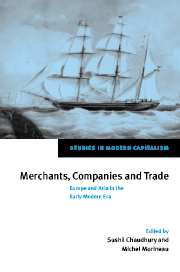Book contents
- Frontmatter
- Contents
- List of contributors
- Preface
- Introduction
- Part I Asia, especially India, around 1500
- 1 Of what world-system was pre-1500 ‘India’ a part?
- 2 Trade in the Indian Ocean at the dawn of the sixteenth century
- Part II Routes, markets and merchants
- Part III European presence in Asia
- Part IV Implications of trade: Asia and Europe
- Index
2 - Trade in the Indian Ocean at the dawn of the sixteenth century
Published online by Cambridge University Press: 02 December 2009
- Frontmatter
- Contents
- List of contributors
- Preface
- Introduction
- Part I Asia, especially India, around 1500
- 1 Of what world-system was pre-1500 ‘India’ a part?
- 2 Trade in the Indian Ocean at the dawn of the sixteenth century
- Part II Routes, markets and merchants
- Part III European presence in Asia
- Part IV Implications of trade: Asia and Europe
- Index
Summary
To the historian, the dawn of the sixteenth century was not just the start of a new chronological period, but one of those moments in history when new sources emerge which enable us to grasp what had been hidden at earlier periods and to make sense of trends that were to be crucial for the future. It is to the year 1500 precisely that the first Portuguese sources on the Indian Ocean can be attributed, the first sources that are both dense and coherent. When we compare them with Oriental data, less rich but older, it seems that new religious, economic and social structures which had developed in the preceding century had created new equilibria and trends, and that political forces were exploding or were about to explode. Where the effect of events is felt in the longer term on economic life, trade and networks will sometimes be drastically changed. A few dates need to be remembered as part of the background to the socio-economic movements of the late fifteenth century.
Two sultanates emerged between 1400 and 1404: that of Gujarat on the western coast of India, whose princes abandoned their allegiance to the Sultan of Delhi, and the sultanate of Malacca in the south of the Malay peninsula, whose raja converted to Islam. These two states which emerged simultaneously more than 5,000 kilometres apart were to make common cause and become the focus for the majority of transoceanic exchanges.
- Type
- Chapter
- Information
- Merchants, Companies and TradeEurope and Asia in the Early Modern Era, pp. 42 - 52Publisher: Cambridge University PressPrint publication year: 1999
- 1
- Cited by



